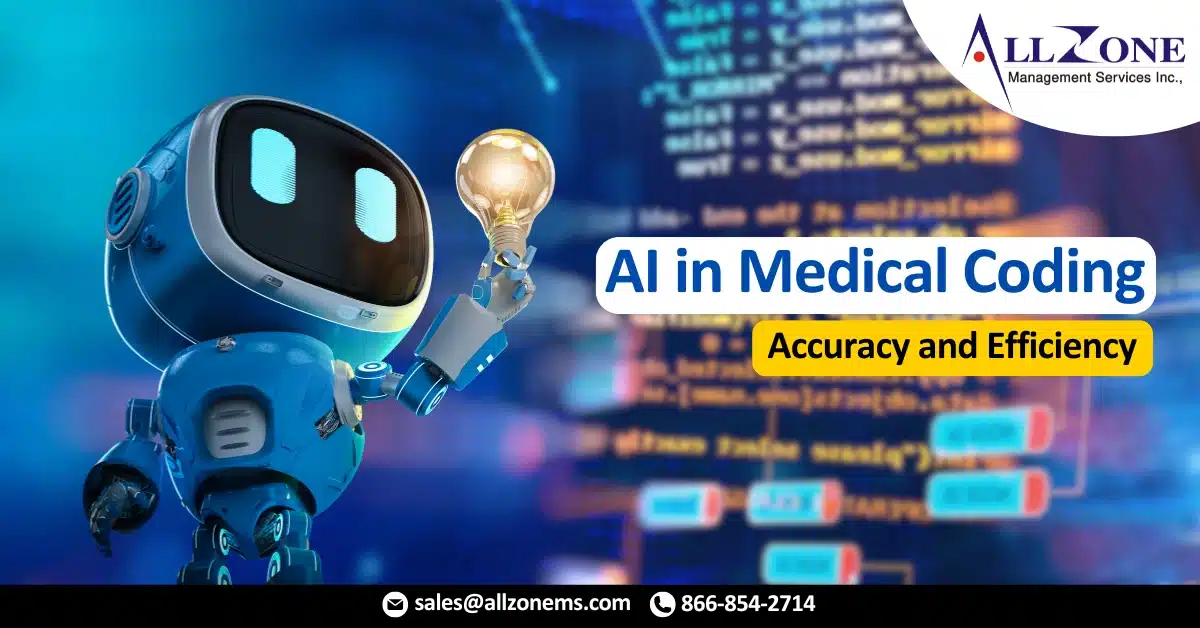Medical coding is the lifeblood of healthcare operations. It forms the crucial bridge between patient care and financial reimbursement, ensuring that healthcare providers are compensated for the services they render. However, the complexity and sheer volume of medical codes, coupled with the ever-evolving regulatory landscape, make accuracy a persistent challenge. This is where the potential of AI in Medical Coding becomes increasingly important, offering solutions to streamline processes and improve accuracy.
Errors in coding can lead to denied claims, reduced revenue, and even legal repercussions. Fortunately, the rise of Artificial Intelligence (AI), particularly Computer-Assisted Coding (CAC) powered by Machine Learning (ML) and Natural Language Processing (NLP), is revolutionizing this field. This application of AI in Medical Coding offers significant improvements in coding efficiency, accuracy, and fraud detection.
The Challenge of Accuracy in Traditional Medical Coding
Traditional medical coding processes are often manual and labor-intensive. Human coders, while highly skilled, are susceptible to errors due to factors such as:
- Complexity of Coding Systems: Medical coding systems, such as ICD-10, CPT, and HCPCS, are vast and intricate, containing thousands of codes that must be precisely matched to the services provided. The nuances between codes can be subtle, requiring extensive knowledge and experience.
- Volume of Data: Healthcare providers generate massive amounts of documentation, including patient charts, medical histories, and physician notes. Manually reviewing and coding this information is a time-consuming and error-prone process.
- Evolving Regulations: The healthcare industry is subject to frequent changes in regulations, coding guidelines, and reimbursement policies. Staying abreast of these updates and incorporating them into coding practices can be a significant challenge.
- Human Error: Like any manual process, medical coding is susceptible to human error. Fatigue, distractions, and simple oversights can lead to inaccurate coding, resulting in claim denials and financial losses.
These challenges highlight the critical need for innovative solutions to improve accuracy and efficiency in medical coding.
The Promise of AI in Medical Coding
AI, particularly CAC powered by ML and NLP, offers a powerful solution to address the limitations of traditional medical coding. These technologies are transforming the field by:
- Automating Documentation Analysis: NLP algorithms can analyze unstructured data, such as physician notes and patient narratives, to extract key medical concepts and identify relevant codes. This automation significantly reduces the manual effort required for coding.
- Improving Code Recognition: ML models can be trained on vast datasets of medical records and coding guidelines to recognize patterns and predict the most appropriate codes for specific diagnoses and procedures. This enhances the accuracy and consistency of coding.
- Reducing Errors: By automating key aspects of the coding process, AI minimizes the risk of human error, leading to a significant reduction in coding mistakes and claim denials.
- Boosting Efficiency: AI-powered CAC systems can process large volumes of data quickly and accurately, significantly increasing the efficiency of the coding process and freeing up human coders to focus on more complex cases.
- Addressing Gaps in Documentation: AI can identify missing or incomplete documentation, prompting providers to provide additional information, which ultimately improves the accuracy of coding and reduces the risk of claim denials.
AI’s Role in Combating Healthcare Fraud
Healthcare fraud is a pervasive problem that costs billions of dollars annually. Fraudulent activities, such as upcoding, billing for services not rendered, and submitting duplicate claims, drain valuable resources from the healthcare system. AI is emerging as a powerful tool in the fight against healthcare fraud, including applications like AI in Medical Coding which can help identify and prevent these fraudulent activities.
- Detecting Suspicious Patterns: AI algorithms can analyze claims data to identify suspicious patterns and anomalies that may indicate fraudulent activity. For example, AI can detect unusual billing patterns for specific providers or inconsistencies between diagnoses and procedures.
- Predicting Fraud Risk: ML models can be trained to predict the likelihood of fraud based on various factors, such as provider demographics, billing history, and patient characteristics. This allows healthcare payers to focus their resources on investigating high-risk claims.
- Preventing Fraudulent Claims: By identifying potential fraud before claims are paid, AI can help prevent fraudulent payments and save healthcare organizations significant amounts of money.
The Future of Medical Coding with AI
The future of medical coding is inextricably linked to the continued advancement and adoption of AI technologies. As AI algorithms become more sophisticated and are trained on larger and more diverse datasets, their accuracy and efficiency will continue to improve. We can expect to see:
- Increased Automation: AI will automate an increasing proportion of the medical coding process, freeing up human coders to focus on more complex and challenging cases.
- Improved Accuracy: AI-powered CAC systems will continue to improve the accuracy of medical coding, reducing claim denials and improving revenue cycle management.
- Enhanced Fraud Detection: AI will play an increasingly important role in detecting and preventing healthcare fraud, protecting the integrity of the healthcare system.
- Integration with EHR Systems: AI-powered coding tools will be seamlessly integrated with Electronic Health Record (EHR) systems, streamlining the coding process and improving data exchange.
- Personalized Coding: AI may be used to personalize coding recommendations based on individual patient characteristics and clinical context.
The Impact of AI on Medical Coding Accuracy
AI is transforming the landscape of medical coding, offering significant improvements in accuracy, efficiency, and fraud detection. By automating key aspects of the coding process, AI is reducing errors, freeing up human coders, and helping healthcare providers combat fraud.
Companies like allzone medical coding company are leveraging these advancements to improve their services. As AI technologies continue to evolve, we can expect to see even greater advancements in the future, leading to a more efficient, accurate, and secure healthcare system. The integration of AI into medical coding is not just a technological advancement; it represents a paradigm shift in how healthcare organizations manage their revenue cycle and ensure the financial sustainability of their operations.

